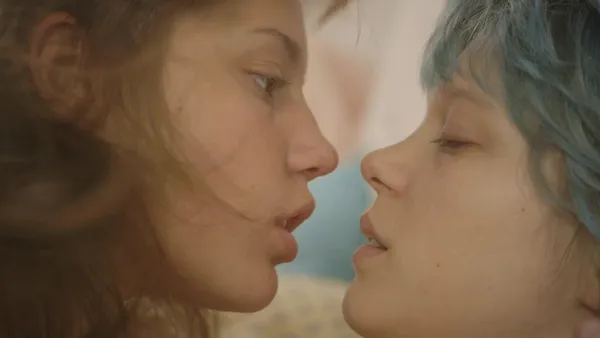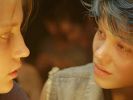Eye For Film >> Movies >> Blue Is The Warmest Colour (2013) Film Review
Blue Is The Warmest Colour
Reviewed by: Richard Mowe

To suggest at this stage in the Cannes Film Festival Competition that a film featuring ultra explicit sex scenes between two young women over the course of a three-hour running time could be a favourite for the Palme d’Or might indicate a bout of temporary insanity.
Abdellatif Kechiche’s non-voyeuristic study of the discovery of female passion and sexuality, however, has demonstrated an ability to move and ensnare the critical consensus unlike any other film in the Competition so far.

Léa Seydoux is Emma, the girl with blue hair, in her fourth year at the Fine Arts Academy. Adèle Exarchopoulos incarnates Adèle, a school girl from a working class family in Lille, who never questions the fact that she is destined to go our with boys. The pair meet and after a hesitant start soon are in the throes of a torrid passion and a fusion of “body and soul” as they discover their true selves.
Similar in tone to his 2003 film Games Of Love And Chance (L'Esquive), this sees Kechiche chart in great emotional and physical detail the development of the relationship as the two women get it together, part and then meet up again. The way the mild-mannered Kechiche pulls you in to the nuances of the relationship makes most screen attempts at portraying intimacy and feelings pale into insignificance.
Shot in a naturalistic manner, the amount of sex on view may deter some viewers but Kechiche’s thesis about the way desire and yearning can hold sway on other emotions requires such close-up explicitness. He makes reference to Pierre de Marivaux’s La Vie De Marianne (reflected in the film’s French title, La Vie D’ Adèle: Chapitres 1 Et 2).
At the core of the director’s concerns is the way the life of the couple will fracture over the years – split by their different vocations (Adèle a teacher, Emma a painter) and the gap that separates them in terms of ambitions, backgrounds, education and fulfilment and their means of achieving happiness.
Whether Steven Spielberg and his jury feel the same way as the reviewers about the power of Kechiche and his actresses, only time (until Sunday) will tell.
Reviewed on: 24 May 2013
















